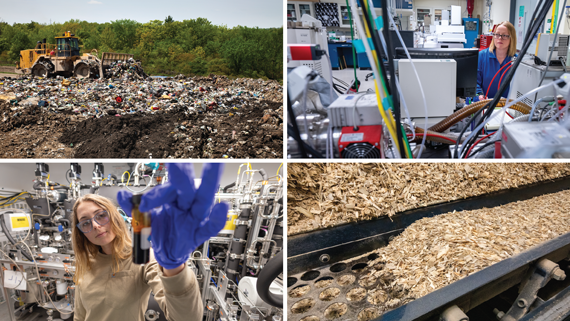U.S. Department of Energy Announces Four Additional Projects to Help Industry Address Bioenergy and Bioproduct Challenges
As Published by the DOE Office of Energy Efficiency and Renewable Energy
Photos courtesy of NREL and Getty Images
The U.S. Department of Energy (DOE) Bioenergy Technologies Office (BETO) awarded $2.18 million in funding to four additional projects as part of the Feedstock-Conversion Interface Consortium (FCIC) 2023 Cooperative Research and Development Agreement (CRADA) call. Funded and led by BETO, the FCIC is a consortium of researchers at nine national laboratories dedicated to reducing the technical risks of biorefinery scale-up. This funding opportunity included competitively selected CRADAs between FCIC partner laboratories and partners from industry and academia interested in leveraging the capabilities of the FCIC.
Partnering laboratory researchers will collaborate with award recipients to understand, quantify, and mitigate the impact of feedstock variability across the bioenergy and bioproduct value chains.
The following projects were selected:
Alder Renewables and the National Renewable Energy Laboratory (NREL) will work together to understand the impact of feedstock variability on bio-oil produced in the Alder Renewable Crude process.
Novastus will work jointly with Oak Ridge National Laboratory to better understand the impact of municipal solid waste (MSW) variability in Novastus’s unique drying process.
VERDE Nanomaterials will collaborate with Lawrence Berkeley National Laboratory, Idaho National Laboratory, and NREL to improve VERDE’s novel lignocellulosic nanofibril production process.
West Biofuels and NREL will team up to investigate the impact of feedstock variability on the performance of the West Biofuels fluidized-bed gasification system.
Learn more about the selected 2023 CRADA projects and FCIC.
FCIC national laboratory partners include Argonne National Laboratory, Idaho National Laboratory, Lawrence Berkeley National Laboratory, Los Alamos National Laboratory, the National Energy Technology Laboratory, the National Renewable Energy Laboratory, Oak Ridge National Laboratory, Pacific Northwest National Laboratory, and Sandia National Laboratories.
BETO supports technology research, development, and demonstration to accelerate greenhouse gas emissions reductions through the cost-effective and sustainable use of biomass and waste feedstocks across the U.S. economy. BETO is part of DOE's Office of Energy Efficiency & Renewable Energy.


